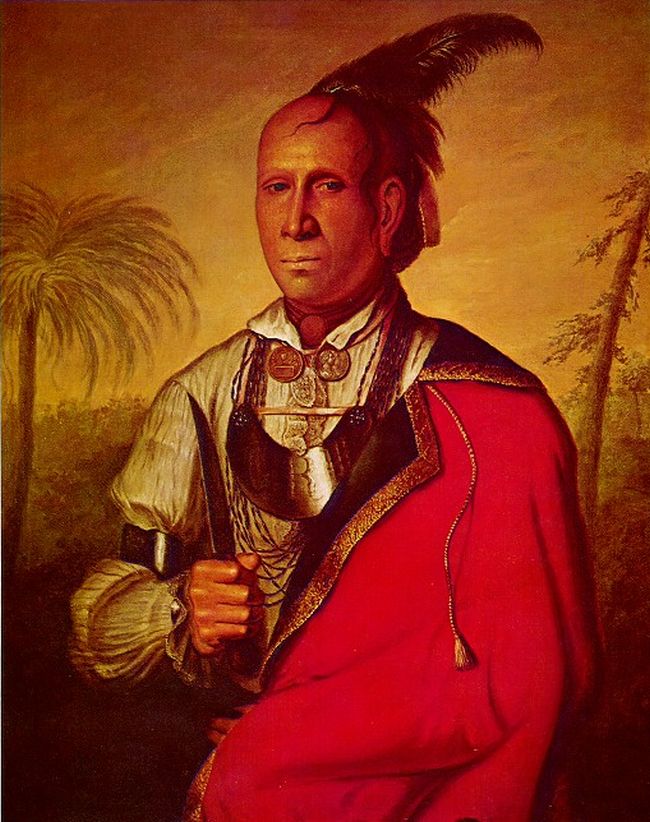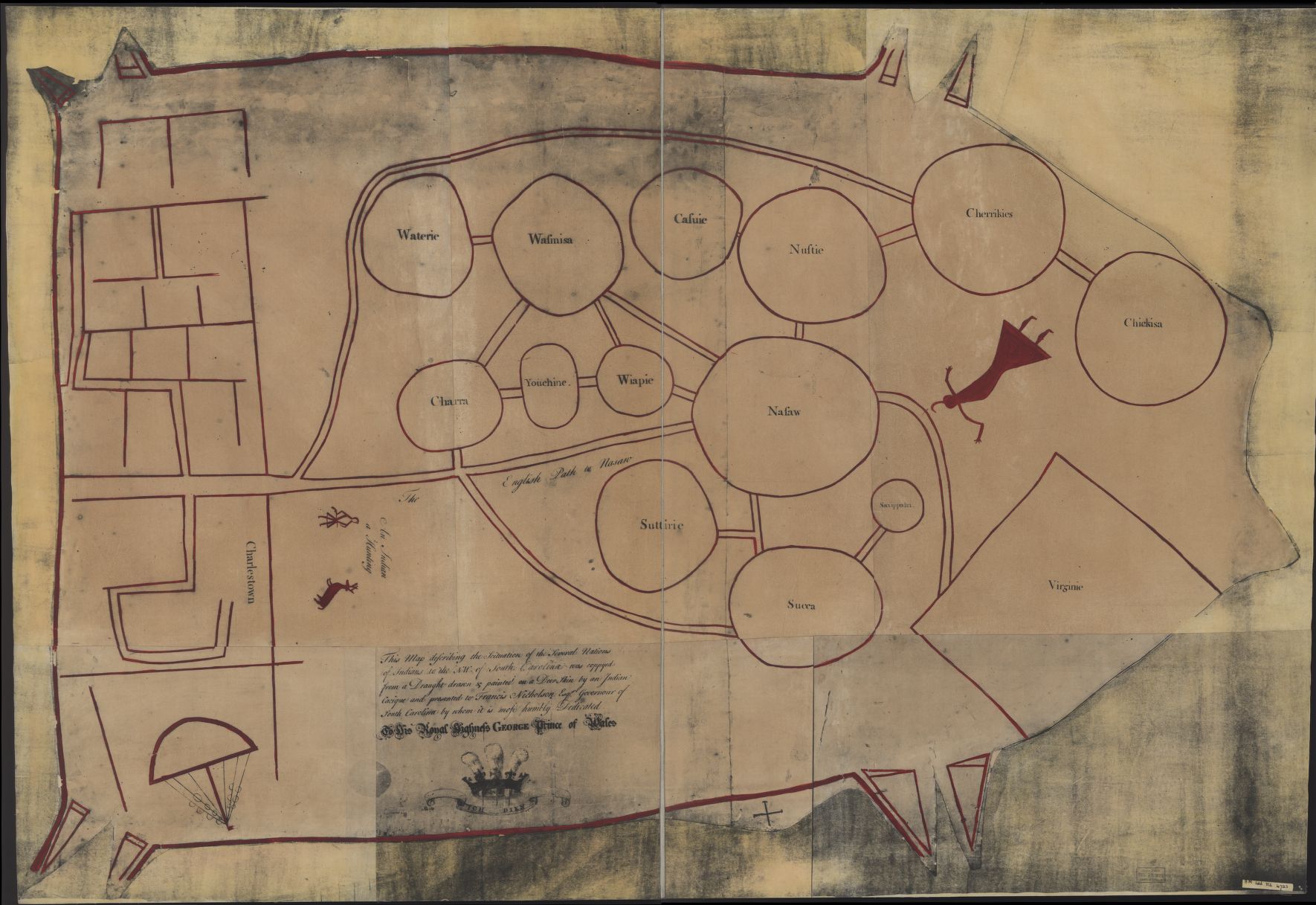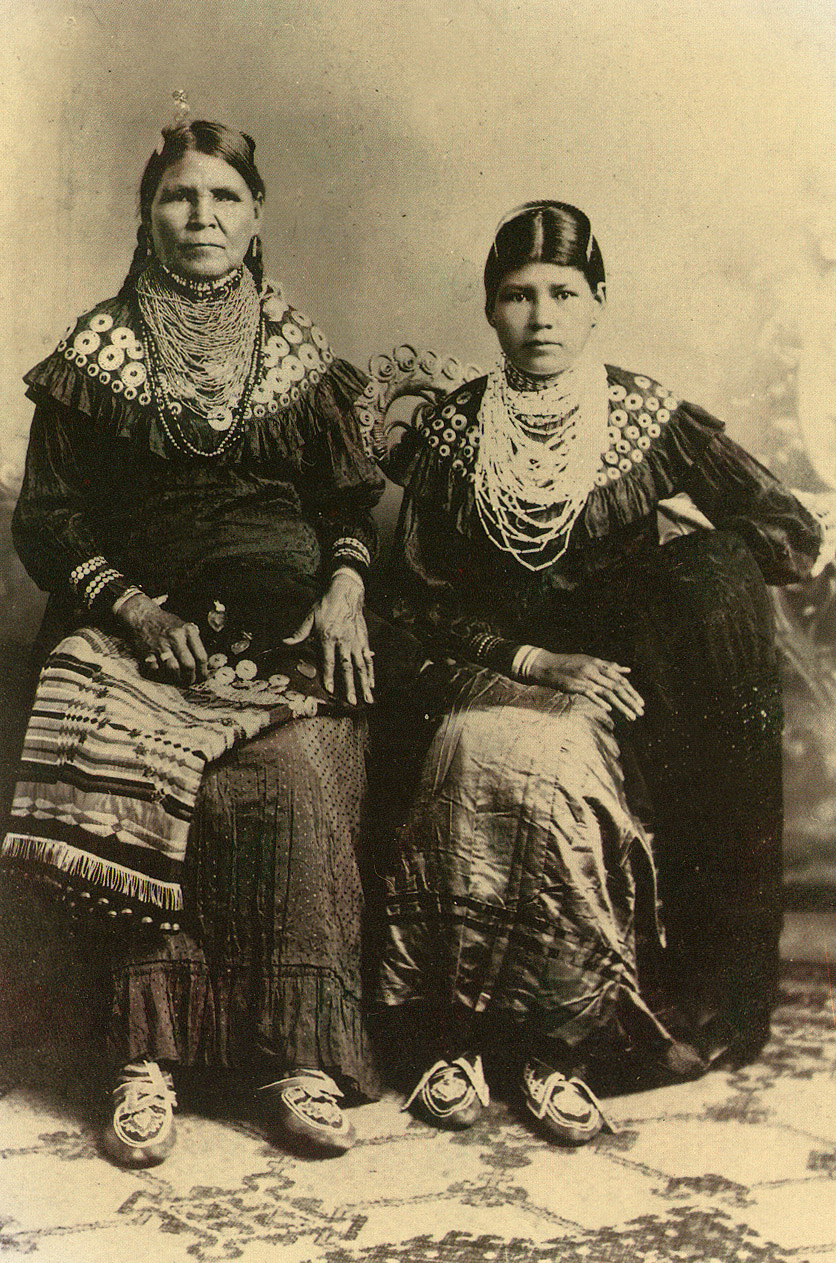|
Conocotocko II
Conocotocko ( chr, ᎬᎾᎦᏙᎦ, Gvnagadoga, "Standing Turkey"), also known by the folk-etymologized name Cunne Shote, was First Beloved Man of the Cherokee from 1760. He succeeded his uncle Conocotocko I (or "Old Hop") upon the latter's death. Pro-French like his uncle, he steered the Cherokee into war with the British colonies of South Carolina, North Carolina, and Virginia in the aftermath of the execution of several Cherokee leaders who were being held hostage at Fort Prince George. He held his title until the end of the Anglo-Cherokee War in 1761, when he was deposed in favor of Attakullakulla. Standing Turkey was one of three Cherokee leaders to go with Henry Timberlake to London in 1762-1763, the others being Ostenaco and Pouting Pigeon. In 1782, he was one of a party of Cherokee which joined the Delaware, Shawnee, and Chickasaw in a diplomatic visit to the Spanish at Fort St. Louis in seeking a new avenue of obtaining arms and other assistance in the prosecution of t ... [...More Info...] [...Related Items...] OR: [Wikipedia] [Google] [Baidu] |
Francis Parsons - Cunne Shote
Francis may refer to: People *Pope Francis, the head of the Catholic Church and sovereign of the Vatican City State and Bishop of Rome *Francis (given name), including a list of people and fictional characters * Francis (surname) Places *Rural Municipality of Francis No. 127, Saskatchewan, Canada *Francis, Saskatchewan, Canada **Francis (electoral district) *Francis, Nebraska *Francis Township, Holt County, Nebraska *Francis, Oklahoma *Francis, Utah Other uses * ''Francis'' (film), the first of a series of comedies featuring Francis the Talking Mule, voiced by Chill Wills *''Francis'', a 1983 play by Julian Mitchell *FRANCIS, a bibliographic database * ''Francis'' (1793), a colonial schooner in Australia *Francis turbine, a type of water turbine *Francis (band), a Sweden-based folk band * Francis, a character played by YouTuber Boogie2988 See also *Saint Francis (other) *Francies, a surname, including a list of people with the name *Francisco (other) * Francisc ... [...More Info...] [...Related Items...] OR: [Wikipedia] [Google] [Baidu] |
London
London is the capital and List of urban areas in the United Kingdom, largest city of England and the United Kingdom, with a population of just under 9 million. It stands on the River Thames in south-east England at the head of a estuary down to the North Sea, and has been a major settlement for two millennia. The City of London, its ancient core and financial centre, was founded by the Roman Empire, Romans as ''Londinium'' and retains its medieval boundaries.See also: Independent city#National capitals, Independent city § National capitals The City of Westminster, to the west of the City of London, has for centuries hosted the national Government of the United Kingdom, government and Parliament of the United Kingdom, parliament. Since the 19th century, the name "London" has also referred to the metropolis around this core, historically split between the Counties of England, counties of Middlesex, Essex, Surrey, Kent, and Hertfordshire, which largely comprises Greater London ... [...More Info...] [...Related Items...] OR: [Wikipedia] [Google] [Baidu] |
People Of Pre-statehood Tennessee
A person ( : people) is a being that has certain capacities or attributes such as reason, morality, consciousness or self-consciousness, and being a part of a culturally established form of social relations such as kinship, ownership of property, or legal responsibility. The defining features of personhood and, consequently, what makes a person count as a person, differ widely among cultures and contexts. In addition to the question of personhood, of what makes a being count as a person to begin with, there are further questions about personal identity and self: both about what makes any particular person that particular person instead of another, and about what makes a person at one time the same person as they were or will be at another time despite any intervening changes. The plural form "people" is often used to refer to an entire nation or ethnic group (as in "a people"), and this was the original meaning of the word; it subsequently acquired its use as a plural form of p ... [...More Info...] [...Related Items...] OR: [Wikipedia] [Google] [Baidu] |
Native American Leaders
Native may refer to: People * Jus soli, citizenship by right of birth * Indigenous peoples, peoples with a set of specific rights based on their historical ties to a particular territory ** Native Americans (other) In arts and entertainment * Native (band), a French R&B band * Native (comics), a character in the X-Men comics universe * ''Native'' (album), a 2013 album by OneRepublic * ''Native'' (2016 film), a British science fiction film * ''The Native'', a Nigerian music magazine In science * Native (computing), software or data formats supported by a certain system * Native language, the language(s) a person has learned from birth * Native metal, any metal that is found in its metallic form, either pure or as an alloy, in nature * Native species, a species whose presence in a region is the result of only natural processes Other uses * Northeast Arizona Technological Institute of Vocational Education (NATIVE), a technology school district in the Arizona portion o ... [...More Info...] [...Related Items...] OR: [Wikipedia] [Google] [Baidu] |
18th-century Native Americans
The 18th century lasted from January 1, 1701 ( MDCCI) to December 31, 1800 ( MDCCC). During the 18th century, elements of Enlightenment thinking culminated in the American, French, and Haitian Revolutions. During the century, slave trading and human trafficking expanded across the shores of the Atlantic, while declining in Russia, China, and Korea. Revolutions began to challenge the legitimacy of monarchical and aristocratic power structures, including the structures and beliefs that supported slavery. The Industrial Revolution began during mid-century, leading to radical changes in human society and the environment. Western historians have occasionally defined the 18th century otherwise for the purposes of their work. For example, the "short" 18th century may be defined as 1715–1789, denoting the period of time between the death of Louis XIV of France and the start of the French Revolution, with an emphasis on directly interconnected events. To historians who expan ... [...More Info...] [...Related Items...] OR: [Wikipedia] [Google] [Baidu] |
White River (Indiana)
The White River is an American two-forked river that flows through central and southern Indiana and is the main tributary to the Wabash River. Via the west fork, considered to be the main stem of the river by the U.S. Board on Geographic Names, the White River is long.U.S. Geological Survey. National Hydrography Dataset high-resolution flowline dataThe National Map accessed May 19, 2011 Indiana's capital, Indianapolis, is located on the river. The two forks meet just north of Petersburg and empty into the Wabash River at Mount Carmel, Illinois. West Fork The West Fork, long, is the main fork of the river. Federal maps refer to it simply as the White River, per a 1950 Board on Geographic Names decision. It starts south of Winchester in Randolph County at 40° 04' 46" N, 84° 55' 58" W in Washington Township. The river winds through Muncie, Anderson, Noblesville, and Indianapolis before being joined by the east fork in the triad of Daviess, Knox, and Pike counties ... [...More Info...] [...Related Items...] OR: [Wikipedia] [Google] [Baidu] |
Chickasaw
The Chickasaw ( ) are an indigenous people of the Southeastern Woodlands. Their traditional territory was in the Southeastern United States of Mississippi, Alabama, and Tennessee as well in southwestern Kentucky. Their language is classified as a member of the Muskogean language family. In the present day, they are organized as the federally recognized Chickasaw Nation. Chickasaw people have a migration story in which they moved from a land west of the Mississippi River, where they settled mostly in present-day northeast Mississippi, northwest Alabama, and into Lawrence County, Tennessee. They had interaction with French, English, and Spanish colonists during the colonial period. The United States considered the Chickasaw one of the Five Civilized Tribes of the Southeast, as they adopted numerous practices of European Americans. Resisting European-American settlers encroaching on their territory, they were forced by the U.S. government to sell their traditional lands ... [...More Info...] [...Related Items...] OR: [Wikipedia] [Google] [Baidu] |
Shawnee
The Shawnee are an Algonquian-speaking indigenous people of the Northeastern Woodlands. In the 17th century they lived in Pennsylvania, and in the 18th century they were in Pennsylvania, Ohio, Indiana and Illinois, with some bands in Kentucky and Alabama. By the 19th century, they were forcibly removed to Missouri, Kansas, Texas, and ultimately Indian Territory, which became Oklahoma under the 1830 Indian Removal Act. Today, Shawnee people are enrolled in three federally recognized tribes, all headquartered in Oklahoma: the Absentee-Shawnee Tribe of Indians, Eastern Shawnee Tribe of Oklahoma, and Shawnee Tribe. Etymology Shawnee has also been written as Shaawanwaki, Ša·wano·ki, Shaawanowi lenaweeki, and Shawano. Algonquian languages have words similar to the archaic ''shawano'' (now: ''shaawanwa'') meaning "south". However, the stem ''šawa-'' does not mean "south" in Shawnee, but "moderate, warm (of weather)": See Charles F. Voegelin, "šawa (plus -ni, -te) MODERA ... [...More Info...] [...Related Items...] OR: [Wikipedia] [Google] [Baidu] |
Lenape
The Lenape (, , or Lenape , del, Lënapeyok) also called the Leni Lenape, Lenni Lenape and Delaware people, are an indigenous peoples of the Northeastern Woodlands, who live in the United States and Canada. Their historical territory included present-day northeastern Delaware, New Jersey and eastern Pennsylvania along the Delaware River watershed, New York City, western Long Island, and the lower Hudson Valley. Today, Lenape people belong to the Delaware Nation and Delaware Tribe of Indians in Oklahoma; the Stockbridge–Munsee Community in Wisconsin; and the Munsee-Delaware Nation, Moravian of the Thames First Nation, and Delaware of Six Nations in Ontario. The Lenape have a matrilineal clan system and historically were matrilocal. During the last decades of the 18th century, most Lenape were removed from their homeland by expanding European colonies. The divisions and troubles of the American Revolutionary War and United States' independence pushed them farth ... [...More Info...] [...Related Items...] OR: [Wikipedia] [Google] [Baidu] |
Ostenaco
Otacity Ostenaco (; chr, ᎤᏥᏗᎯ ᎤᏍᏔᎾᏆ, Utsidihi Ustanaqua, or "Bighead"; c. 1710Kate Fullagar, ''The Warrior, the Voyager, and the Artist: Three Lives in an Age of Empire,'' Yale University Press 2020 p.13. – 1780) was a Cherokee leader and warrior of the 18th century. By his thirties, he had assumed the warrior rank of ''Utsidihi'' (Mankiller), and the title of the Tassite of Great Tellico. He then rose to assume the higher Cherokee rank of Cherokee chief warrior or '' skiagusta'', orator, and leading figure in diplomacy with British colonial authorities. The name Otacity has a variety of spellings. Birth and early life He was born in the thickly-settled Cherokee township of Tellico. It has been conjectured that he was born into the ''Ani-waya''(Wolf) clan, the one associated in particular with bearing numerous warriors. He was often referred to among white colonists as Judd's Friend, referring to his relationship of a trader by that name After the ... [...More Info...] [...Related Items...] OR: [Wikipedia] [Google] [Baidu] |
Henry Timberlake
Henry Timberlake (1730 or 1735 – September 30, 1765) was a colonial Anglo-American officer, journalist, and cartographer. He was born in the Colony of Virginia and died in England. He is best known for his work as an emissary from the British colonies to the Overhill Cherokee during the 1761–1762 Timberlake Expedition. Timberlake's account of his journeys to the Cherokee, published posthumously as his memoirs in 1765, became a primary source for later studies of the people's eighteenth-century culture. His detailed descriptions of Cherokee towns, townhouses (also known as councilhouses), weapons, and tools have been invaluable to later historians and anthropologists. The details have helped them identify Cherokee structures and cultural objects uncovered at modern archaeological excavation sites throughout the southern Appalachian region.Schroedel, G.FHenry Timberlakei''The Tennessee Encyclopedia of History and Culture'' Retrieved 2012-04-24. For instance, during the Telli ... [...More Info...] [...Related Items...] OR: [Wikipedia] [Google] [Baidu] |

_1938.jpg)


